
Every story has a point where the page could have turned differently – where a single choice might have rewritten everything that followed. My portrayal of Draco Malfoy begins there: in the silence that came after the Battle of Hogwarts, where the dust of legacy and regret still lingers in the air. This version of Draco is not bound to one path, nor confined by a single interpretation. Each story written through him explores a new branch of possibility – redemption, defiance, exile, introspection, or the quiet pursuit of meaning in a world rebuilt from ruin. Every prompt is an invitation, not a limitation. Each collaboration shapes the man anew, and every narrative I craft through him is written with care, immersion, and the willingness to evolve. I welcome creativity and adaptation, always striving to please, to challenge, and, when needed, to fail and rise again until the story feels alive. Here, Draco is more than a shadow of his former self. He is the echo of what could have been – and the question of what might still be.
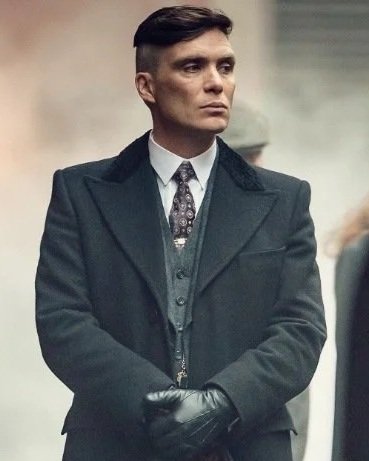
This portrayal exists in the narrow stretch of time after Major Campbell’s death, when the smoke has barely cleared and the foundations of power in Birmingham are still settling. **Peaky Blinders** continues here with Polly, John, and Michael alive, their presence shaping every decision made behind closed doors and in dimly lit offices thick with cigarette smoke. My Thomas Shelby is, at first glance, almost indistinguishable from the man you know. He is ruthless, calculating, and unflinchingly violent when necessity demands it. Strategy still comes before sentiment. Loyalty is still measured in blood and consequence. Yet there is a subtle shift beneath the surface. His demeanor is calmer, colder, stripped of excess motion and expression. Where others rage or boast, he watches. Where others speak, he listens. Emotion is not absent - it is simply locked away behind a gaze that reveals nothing and promises even less. This Tommy does not seek chaos for its own sake. He allows silence to do the work of threats. Decisions are made with precision, not haste, and carried out without spectacle. Those close to him may notice that the war has not softened him - it has refined him. He has learned that stillness can be more terrifying than violence, and patience more lethal than fury. This roleplay portrayal is not a fixed retelling. It is a foundation. The character stands where canon leaves him, but the road ahead is deliberately unwritten. Allies may become enemies. Empires may expand or collapse. Old wounds can reopen, or new ambitions take root. As a roleplay partner, you are invited not to observe from the sidelines, but to step into the world and shape its future alongside him. Thomas Shelby remains who he is - but what he becomes next is entirely open.

Thane Varyn was once a Jedi Knight of the Republic, though no record of that remains in any official archive. What remains is a shadow - one not bound by allegiance or title, but by purpose carved from ash and silence. He was raised within the halls of the Jedi Temple on Coruscant, taken as a child like so many others, taught discipline, detachment, and peace. Even then, he was different. Quiet. Precise. Where other younglings faltered or questioned, Thane observed. Where others sought camaraderie, he sought clarity. His instructors noted an unusual focus in him, something that sat just beyond the doctrine they tried to impress. In his later training, he was briefly placed under the instruction of Anakin Skywalker. It was not a formal apprenticeship - nothing so structured - but it left a mark. Skywalker recognized in Thane a mind like a drawn blade, a warrior who had not yet seen battle. Under his guidance, Thane refined his technique in Form V - Djem So - a lightsaber discipline centered on strength, counterattacks, and relentless control. When the Clone Wars ignited, Thane was knighted and sent to the Outer Rim, where he fought with cold efficiency, gaining a reputation for quick decisions and minimal losses. His lightsaber was silver-white, his movements fluid, his presence in the Force steady and restrained. But like so many of his kind, he never saw the betrayal coming. During a mission far from Republic space, his clone troopers turned on him without warning. He survived only because his instincts - sharpened through years of tension - drove him to eject from his transport moments before it was destroyed. He crash-landed on an uncharted world, grievously injured, and left for dead. He did not die. In the months that followed, Thane faded into the Outer Rim, pursued by bounty hunters and hunted by Inquisitors who believed all Jedi should be purged. He became more than cautious - he became invisible. The Force was no longer a beacon for him, but a tether he learned to suppress. He walked through cities where his name had once brought respect, now bringing only silence. In time, he was drawn to Mustafar, guided by something unspoken. There, among the obsidian rock and rivers of fire, he found the remains of a wrecked Jedi Interceptor - scorched, forgotten, and nearly swallowed by time. It had once belonged to Skywalker. He knew it even before he touched the hull. It took weeks to restore the vessel, weeks of silence, scavenging, and mechanical improvisation. But when he ignited its engines, it roared like it had never died. During that time, a bounty hunter came for him. The duel was brutal. Thane won - but not without scars. He took the hunter’s helmet, cracked and scorched, and made it his own. Not to hide - he had nothing left to hide - but to remember. The man who wore that face had died with the Republic. What remained was something colder. Something still burning. Now, Thane Varyn moves between systems like a ghost. His Interceptor has no markings. Its hull is painted a deep navy blue. The transponder is blank. The ship answers to no name, just as he no longer answers to "Jedi." He wears fragments of his old robes beneath scavenged armor - functional, silent, devoid of ceremony. His lightsaber is still silver-white, though it now hums with a colder edge. His helmet hides his face and modulates his voice into a low, calm tone that rarely rises. He speaks only when necessary. He acts with finality. He does not lecture, and he does not beg. Thane Varyn does not serve the light, nor embrace the dark. He does not walk the Jedi path, nor seek the Sith’s strength. What he does follow is purpose - the same kind that cannot be taught in temples or stolen by fear. He respects Darth Vader, not as a Sith, but as a symbol of commitment. He understands what it means to burn yourself down for something you believe in, even if that belief is flawed. In Vader, he sees what the Jedi feared to become. In himself, he sees what they failed to become. He has no home. No allies. No master. Only the will to endure. He strikes only when necessary, speaks only when there is truth to be said, and answers to no one but his own sense of what still matters in a galaxy that has long forgotten what justice means. His enemies call him dangerous. Survivors call him precise. And those who hear the silver blade ignite in the dark rarely live to speak his name. Not because he is cruel - he is not - but because mercy has become a luxury he no longer believes in. He remembers who he was, and that is why he endures. He remembers who the Jedi were, and that is why he does not return. And he remembers who survived. That is why he fights. Thane Varyn is not a hero. He is not a weapon. He is the echo of a war that never truly ended - and the quiet will of a man who refuses to forget what it cost.
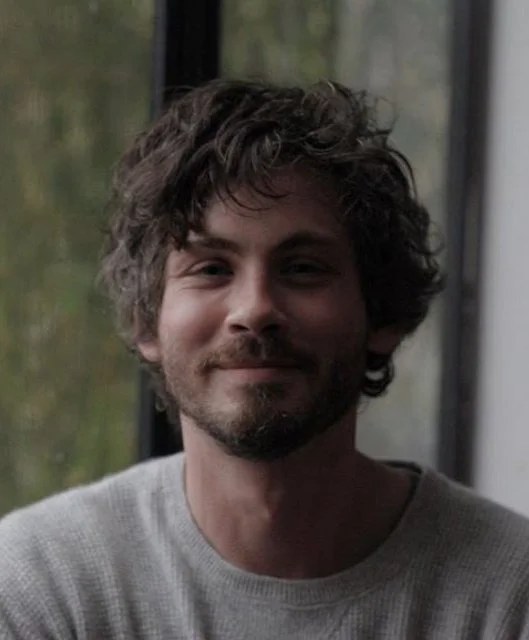
Robin Clay was barely into his mid twenties when the world ended, sworn into full military service only weeks before the epidemic tore through cities, bases, and command structures alike. Trained in reconnaissance, firearms, stealth movement, and field survival, he survived the collapse not through luck but discipline - adapting military doctrine to a lawless wasteland where ammunition, trust, and time became scarce resources. In the early days of the outbreak, he witnessed failed containment efforts, classified troop movements, and decisions that hinted at a truth far more deliberate than the official narrative ever admitted. When the chain of command finally dissolved, Robin continued alone, carrying fragments of training and half remembered orders into the ruins of civilization. Years later, he moves through contaminated zones, dead cities, and open wastelands as a solitary tracker and investigator, skilled in long range combat, urban stealth, scavenging, field medicine, and equipment maintenance. Quiet, observant, and emotionally restrained, he follows a strict personal code shaped by military conditioning rather than ideology or faction loyalty. His purpose is not redemption nor the salvation of what remains of humanity, but understanding - a relentless search for the origin of the epidemic that ended the world, driven by the belief that civilization did not simply collapse, but was deliberately brought to its knees.

Enzo Bellarosa. His name is a whisper in the corners of the underworld, spoken by men who claim to know him but never with certainty. Italian by blood, Sicilian by upbringing, he was never a soldier to any Don, never a Made Man in any family. He was not a figure of great importance, but a man whose path crossed enough shadows to give rise to stories. To some he was nothing more than a name, to others a rumor with a face, yet wherever he went there seemed to follow quiet intrigue. In the days of Mafia: The Old Country, Enzo’s story unfolded against the backdrop of Sicily when Enzo Favara had already secured his place as a Made Man in the Torrisi family. While Favara bound his life to the oath of omertà, Bellarosa walked a less certain road. Born the son of a stonemason in a village where vendettas were older than the church walls, Enzo grew into a man who carried his own code. His reputation began when he avenged his father’s murder, killing the brigand responsible with a stiletto beneath the tolling of chapel bells. Families heard of the deed and some tried to draw him in, but Enzo never took the oath. He drifted from village to city, from Palermo to Naples, working odd jobs and lending his hand when paid, his name mentioned in back rooms though never held in high regard. To the Torrisis and their rivals, he was an outsider, known more as a curiosity than as a threat. A man without a family, remembered only because he never quite disappeared. In the world of Mafia III, Enzo lived in New Bordeaux during the turbulent years when Lincoln Clay waged war against the Marcanos. He and Lincoln never crossed paths, though their names sometimes appeared in the same breath, if only because both were Sicilians in a city of shifting power. By then Bellarosa was an older man, his silence and distance giving rise to small rumors. Some claimed he had once run whiskey through the bayous during Prohibition. Others swore he had vanished to Cuba after a killing, only to resurface years later. By the 1960s he was little more than a shadow on the edge of the city, a figure known but seldom seen. The families called him the Free Sicilian, sometimes with a chuckle, sometimes with a touch of respect, for he had managed to live his life without bending his knee to any of them. Enzo Bellarosa exists in both tales, but never the same one. In Sicily, he was the young man whose stiletto ended a feud no one cared to remember. In New Bordeaux, he was a quiet figure who lived beneath the notice of great men. Two different times, two different worlds, bound together by a single thread: Enzo Bellarosa, the man without a family, a name passed around in whispers more than in truth.

Marcus Rourke is a name spoken aloud in courtrooms, police briefings, and FBI files. In his twenties he was one of the most capable bank robbers in the Midwest, a man with a steady hand and a reputation for precision. He and his crew hit banks, armored convoys, and safe houses with clockwork efficiency. For nearly a decade, Marcus lived in the adrenaline-soaked twilight between outlaw fame and federal pursuit. Then came the job that shattered everything. A bank job gone wrong - sirens too fast, bullets flying, crew members cut down in the street. Some said there was a leak, others said Marcus himself pulled the trigger that set the whole mess ablaze. What mattered was the aftermath: most of his crew dead or in chains, and Marcus Rourke vanishing like smoke. Officially, he is still wanted. His name is inked on posters and databases, a face that agents and detectives keep in the back of their minds. Rumors put him in Mexico, or working with cartels overseas, or dead in some ditch. But the truth is stranger. Marcus Rourke did not run across the border - he buried himself under a new identity. Now he lives as Daniel Cross, a thirty-two-year-old police officer in a state far from the crimes that made his name. His badge gleams, his record is clean, and to his fellow officers he is just another young cop. He works long shifts, keeps his head down, and never lets anyone close enough to ask the wrong questions. He is single, solitary, and disciplined - always alert for the day when someone will put his two lives together. Marcus’s personality is a mask of contrasts. As Daniel Cross, he is calm, dependable, even friendly. As Marcus Rourke, he is haunted and sharp, a man who cannot forget the rhythm of a robbery, the rush of a getaway, or the weight of the gun in his hands. He tells himself he has left that world behind, but deep inside, the outlaw has not gone anywhere. He is just hiding in uniform. His life is a fragile balance: lawman by day, fugitive in truth. One witness, one slip, one case brushing too close to his past - and everything will collapse. Until then, Marcus Rourke walks the thin line between redemption and exposure, a wanted man living in plain sight. Marcus Rourke carries himself with a kind of practiced ordinariness. Standing just under six feet, with a lean but wiry build, he looks every bit the working cop who runs his miles in the morning and takes his coffee black. His hair is dark brown and kept close-cropped, his jaw usually shadowed with stubble he never quite bothers to shave away. His eyes - sharp gray with hints of blue - are the only thing that betray him. They are alert, measuring, and hard to read, like a man always calculating exits and outcomes. As Daniel Cross, he dresses in plain, functional clothes off duty - jeans, neutral jackets, boots. Nothing flashy, nothing memorable. On duty, his uniform is always squared away, his badge polished, his gear organized. He gives the impression of a cop who takes the job seriously but does not crave attention. His behavior reflects a man constantly in control. He never raises his voice unless absolutely necessary. He listens more than he speaks, observing people and letting them underestimate him. With colleagues he is friendly but not intimate, steering conversations toward work and surface-level topics. With strangers, he projects a calm professionalism that puts people at ease. Yet beneath that surface is the outlaw’s edge. He moves like someone used to tension, his posture always a little coiled, as if he expects trouble around the corner. When danger arises, the mask slips - he reacts with a precision and calm that few ordinary cops could match, drawing from years of running heists and surviving firefights. Marcus Rourke is a man who has learned to disappear in plain sight. His appearance and behavior are designed to make him unremarkable. And yet, for those who know what to look for, the wolf never truly hides beneath the sheep’s clothing.

Corrado Bellandi carried the kind of face that blended into crowds - lean, angular, and unremarkable at first glance. His cheekbones were sharp, his nose slightly crooked from a break in his youth, and his mouth seemed forever poised between silence and a half-formed reply. His eyes were the only striking thing about him: dark and steady, the eyes of a man who had learned to listen more than he spoke. They gave the impression of someone measuring everything and everyone, as though weighing the value of every word before it was spoken aloud. He stood a shade under six feet, with a wiry frame hardened by years of work on the docks and backstreets. Corrado was not built like a soldier but like a survivor - all corded muscle and restless movement, as if he was always ready to slip away before danger noticed him. A faint scar ran from his left temple down toward his jaw, a relic of a knife fight he had never boasted about. His hands bore callouses from rope and iron, work that had been both honest and otherwise. Clothing, for Corrado, was another kind of disguise. In Palermo he favored simple jackets and shirts rolled at the sleeve, the clothes of a laborer or driver. Abroad, he wore what was needed: the dark suit of a detective, the trench coat of a policeman, the casual ease of a traveler. He did not have the swagger of a gangster, nor the polished elegance of a Don’s inner circle. He dressed to be overlooked. His manner was much the same. Corrado rarely raised his voice, and when he spoke it was with a calm cadence that made people lean in to hear him. He had a habit of rubbing the back of his neck when pressed for an answer, as though dragging words up from somewhere deep. He smoked cheap Italian cigarettes, often lighting one only to let it burn away between his fingers while he thought. In company he was courteous but distant, keeping his humor dry and understated. What most remembered about him, if they remembered him at all, was the way he watched. Corrado Bellandi was a man who missed little - a gesture, a slip of the tongue, the nervous twitch of someone hiding a lie. He had learned to live in the spaces between other men’s words, and that made him dangerous, in his own quiet way.
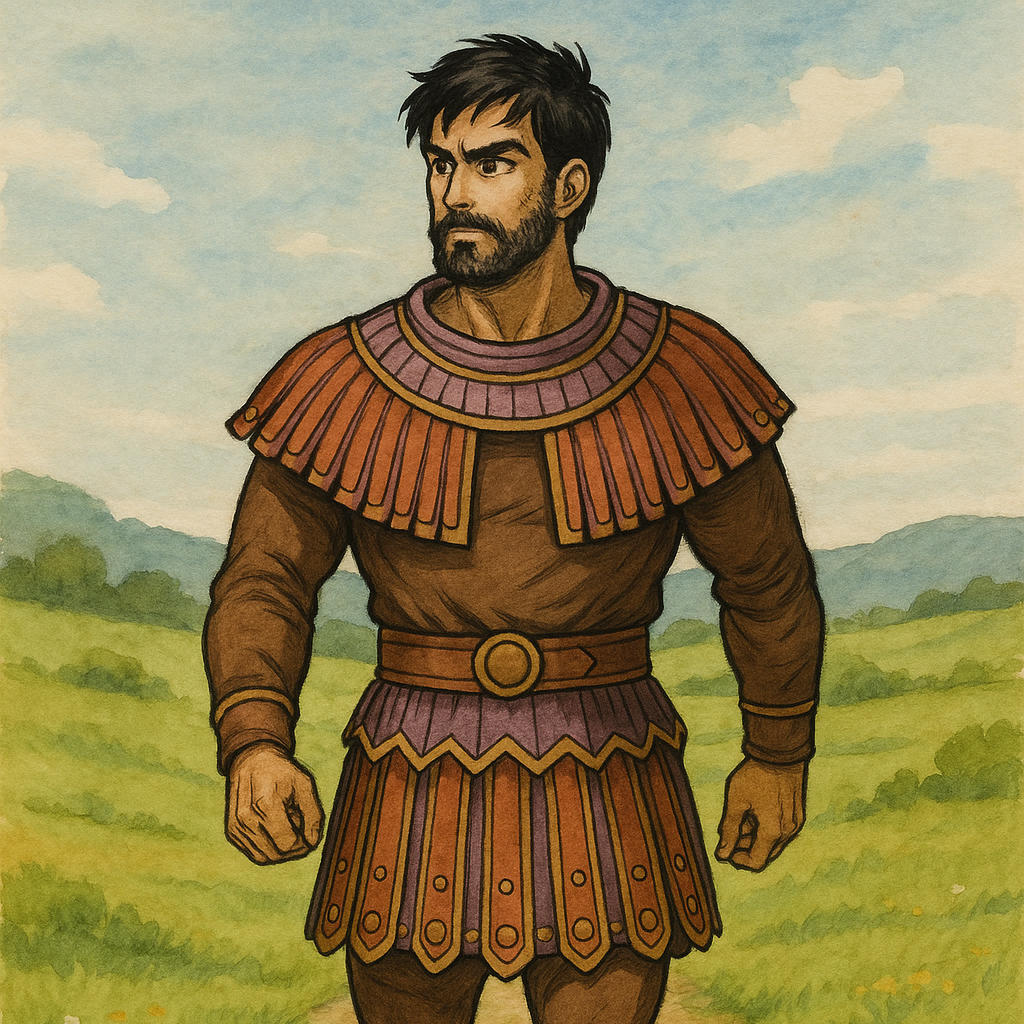
Aren was once a sentinel of the Observatory, a Celestrian sworn to gather benevolessence and carry it to Yggdrasil. His wings were bright with celestial light, his halo crowned his brow, and his duty was clear, to watch over the Protectorate without ever sharing in its joys or its sorrows. When calamity struck and the Observatory fell, Aren was cast down into the world of mortals, stripped of his divinity, left fragile and uncertain. In those days of wandering, he discovered what eternity had never taught him. He felt hunger, fear, and grief, but also laughter by firelight, the warmth of friendship, and the unyielding resilience that burned in mortal hearts. When the Gittish Empire was defeated and the World Tree restored, the heavens looked once more to their eternal vigil. Yet Aren did not return. Instead he came before Apus Major and spoke with resolve. He no longer wished to stand apart, haloed and distant. He wished to walk among mortals, not as guardian but as brother. With sorrow and understanding, Apus Major granted his request. Aren’s halo dimmed, his wings dissolved into starlight, and for the first time his heart beat with the weight of mortality. Tall and lean, with the wiry strength of a traveler, Aren’s dark hair is often tousled by the winds of the plains, and a proper beard frames his face, lending him the air of a seasoned pilgrim. His eyes still shimmer faintly with a trace of the heavens, and upon his shoulders are faint golden scars where wings once unfurled. He wears the Celestial Suit that once marked him as divine, the tasseled mantle over a simple tunic, purple and bronze trim with yellow leggings and cuffed boots. The fabric is worn from long roads and changing seasons, patched not with gold but with the plain cloth of villages he has passed through. He carries no weapon, walking with empty hands, for he has chosen a path not of conquest but of understanding. Aren retraces the Hero’s pilgrimage, not to reclaim glory but to see the Protectorate with mortal eyes. In Stornway he moves between king and commoner, learning that trust binds them both. In Zere he takes up the plough and feels the rhythm of the soil. In Bloomingdale he listens to stories of love and grief, learning that sorrow can endure alongside devotion. In Batsureg he joins the mountain hunts and rituals, finding courage in hardship. In Porth Llaffan he breathes the salt spray and remembers how close despair had come with Lleviathan’s shadow. In Swinedimples Academy he studies beside eager young scholars, understanding how learning itself is a form of light. In Wormwood Creek he ends his pilgrimage, surrounded by ancient stories, placing his own within the long memory of humankind. Those who meet him find not a god but a quiet man who listens more than he speaks, who smiles at the simple things, who bears his scars without regret. His story is not one of crowns or victories but of humility, of endurance, of a divine who chose to live as human. Among the Protectorate he will be remembered not as savior, nor as guardian, but as a pilgrim who once bore wings and chose instead to walk as brother.
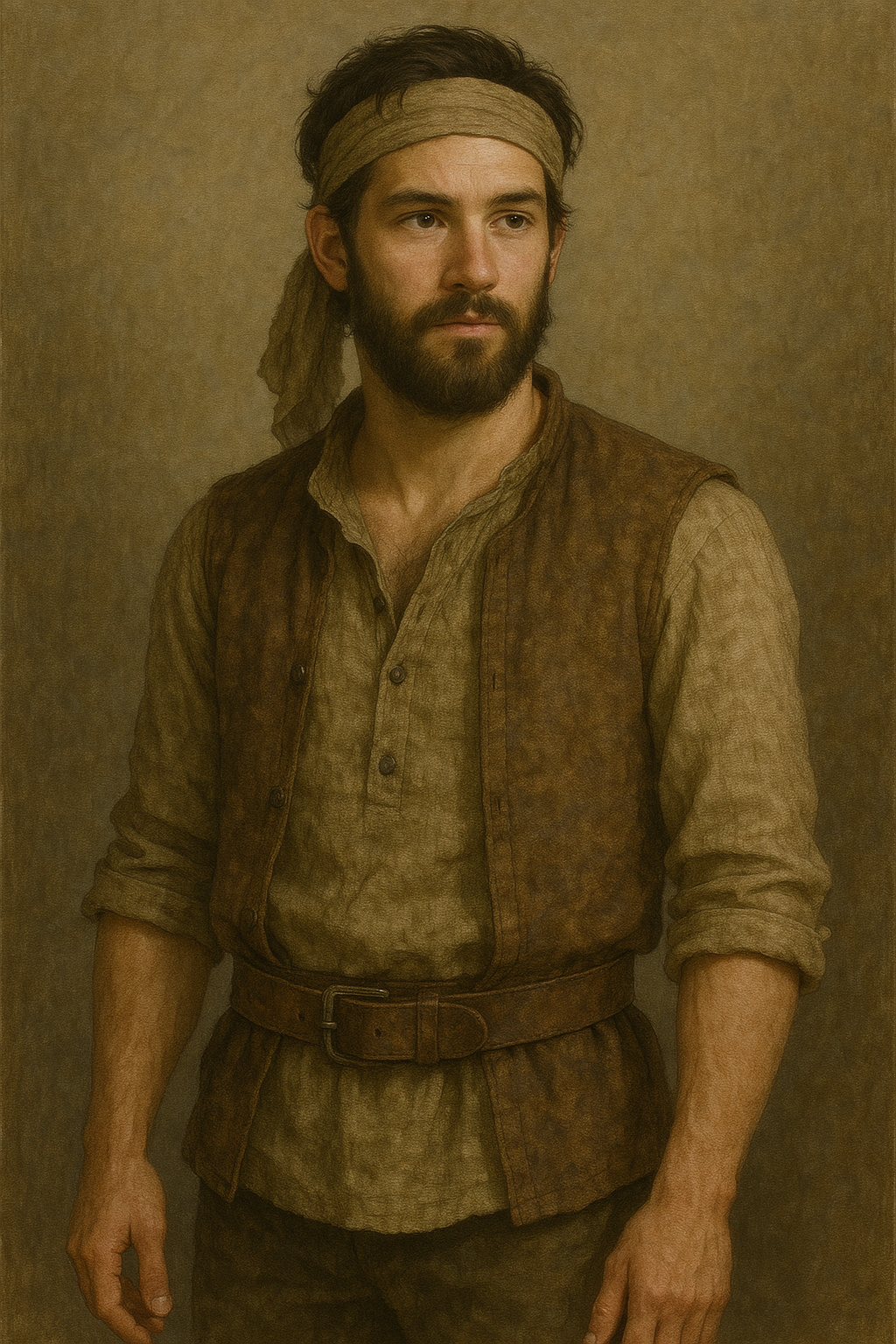
Elias Dorne was born in a coastal village at the edge of the mortal kingdoms, where fishermen braved the tide and storms were spoken of as living things. He was no warrior, nor scholar, nor nobleman - just an ordinary man, the son of a craftsman who carved wood into tools and ships’ masts. His life had been steady, simple, and mortal in every sense, until the night he met her. She came like a vision across the tide, silver light clinging to her form as though the moon itself had taken shape. Her name was Lyssara, daughter of a people who walked the firmament and spoke with voices like song. Though she was revered as one of the “Celestrials” - beings who seemed closer to gods than flesh - she did not look upon Elias with disdain. Instead, she chose him, claiming before her kin that this mortal was the one she wished to wed. But the laws of her kind were older than empires. No Celestial woman could take a mortal husband unless he proved himself. The trial was cruel in its ambiguity: he must prove his worth - yet none would tell him how. No path was marked, no task given. The elders of Lyssara’s tribe only watched, waiting to see if he would stumble, or if some inner truth within him would reveal itself. Elias is no chosen warrior, no prophesied child. What he has instead is resolve - the stubborn spark of a man unwilling to yield, even when facing trials no mortal has yet survived. To win her hand, he must search across both mortal and celestial realms, confronting dangers meant to break him and puzzles meant to confound him, until he discovers what “worthiness” truly means.
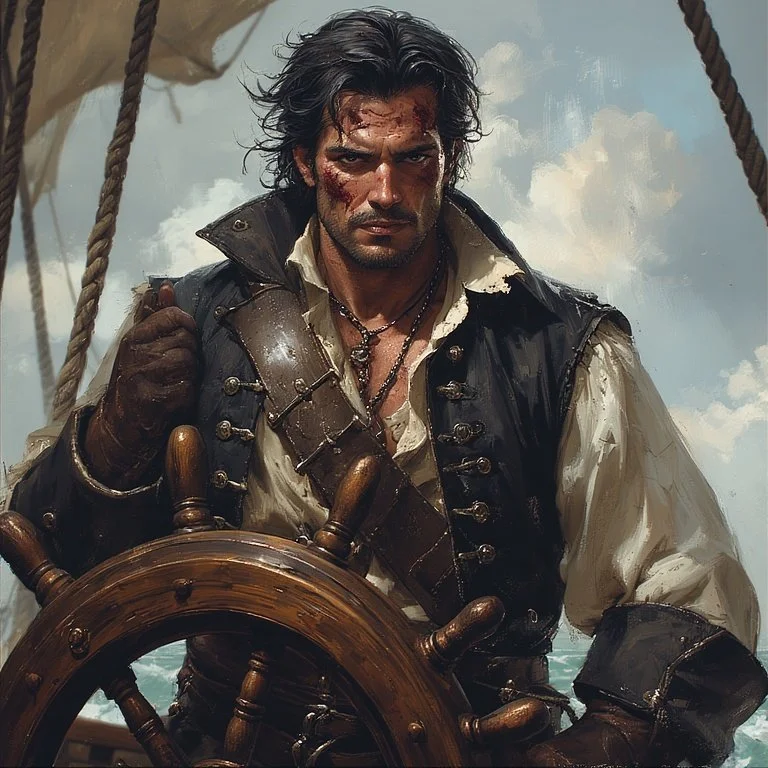
No man aboard his ship knew the name he was born with, and none dared ask. To the world, he was Kane Larkin - successor to Captain Villanueva, the Spanish Pirate Lord. His was a name spoken in hushed tones in taverns and ports, heavy with both fear and respect. He ruled not with bluster, nor with the drunken laughter of lesser captains, but with silence, precision, and the cold weight of consequence. Kane was a man built by storms. His sea-grey eyes carried the stillness of a predator, his scarred jaw a reminder that he had stared into death and chosen to return. He wore the long, weather-beaten Navy coat stripped of its insignia, patched with mismatched sailcloth and charred by fire. A torn tricorne sat low over his brow, its shadow adding to the severity of his presence. At his hip, the flintlock pistol of Spanish make and a swept-hilt cutlass were never out of reach, weapons as much a part of him as the coat upon his shoulders. He was ruthless, but not reckless. Kane struck hard, struck true, and struck only when purpose demanded. He held no patience for indulgent cruelty nor for wasteful slaughter - but when disobedience festered, when lawlessness threatened his command, his retribution was swift and merciless. His crew followed not because they adored him, but because they feared what disobedience would cost. Even Amira, who defied and resisted him at every turn, saw the discipline and cunning in his every movement. Where others relied on fire and rage, Kane relied on silence and steel. His word was iron, his rule unyielding. He bore no love for the crowns of Europe, nor trust in the Brethren Court, yet the seat he claimed as Villanueva’s successor was his by right of strength and cunning. In his hands, power was never squandered - only honed, sharpened, wielded like a cutlass in the dark. And yet, for all his coldness, there were lines he would not cross. He did not kill without necessity, nor did he give in to the base appetites that many pirates indulged freely. He had no need for such weakness. Control was his true weapon - over his men, over his enemies, and over himself. It was this self-command, this refusal to let impulse rule, that made him formidable. Still, Kane Larkin was not without ghosts. The loss of his past crew weighed upon him, the betrayal of the Admiralty still a silent scar deeper than any wound upon his flesh. These shadows followed him, shaping the man into something colder than most could endure - a man who trusted none, not even those who stood closest to him. Not Amira, not Porter, not any soul who dared stand on his deck. He was a Pirate Lord, yes, but also more: he was the silence before the shot, the storm before the wave. Kane Larkin was the certainty that in a world of shifting loyalties and treacherous seas, there still remained one captain whose word was law, whose code was iron, and whose fist never faltered.
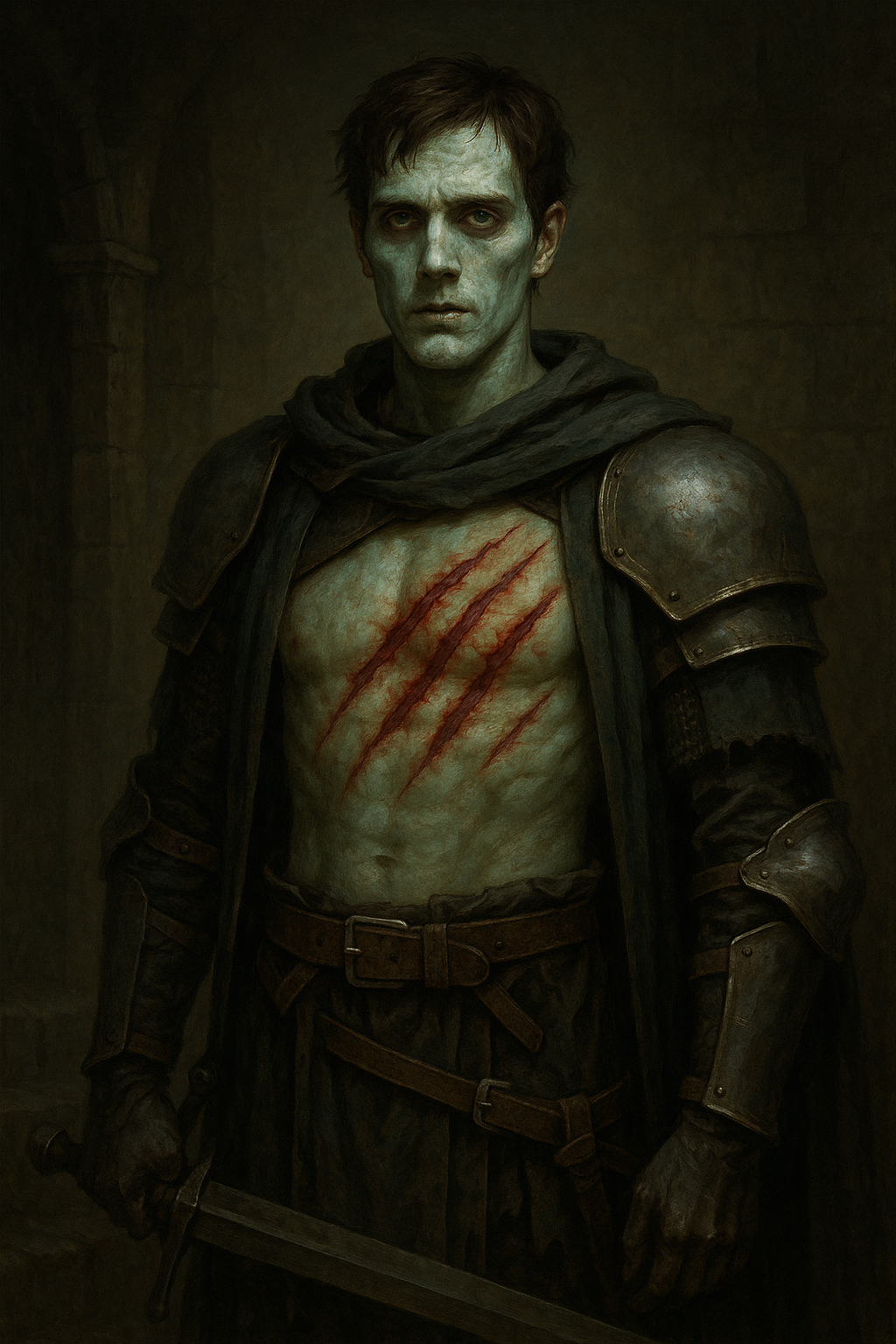
Ser Derrick Veer is a man who wears death upon his flesh. He stands taller than most, broad of chest and shoulder, with the bearing of one who once held his place in the king’s line of battle. His frame is not gaunt, nor is it whole, but something between: the sinew and muscle seem hard as wrought cord, his movements precise and heavy, as though every step recalls the discipline of the drill-yard. His face is pale, drawn taut as if the grave’s cold hand had never quite let go. The jaw is strong, squared like the hewn stones of old keeps, and his cheekbones sharp enough to cast shadows beneath his eyes. That gaze is the most unsettling of all: gray and rimmed with a ghostly gleam, like moonlight reflecting on steel. Few can hold it for long, for in his eyes is neither warmth nor rage, but the patience of one who has endured a hundred years of silence. His hair, once dark, has grown ashen with the touch of the grave, worn long to his shoulders, ragged and uneven, often caught by the wind like strands of weathered rope. But the scars are what men remember. Four vast furrows slash across his torso, carved from shoulder to hip in brutal arcs, as though some great beast had torn him open with clawed hands. The flesh around them is puckered and pale, unhealed though a century has passed, a constant reminder that his body is not that of a living man. His attire speaks of both ruin and resilience. The surcoat he wears, though moth-eaten and threadbare, still clings to life, the faded ghost of a crest half-lost to time. His armor is no knight’s finery - instead it is scavenged, a patchwork of dented plate and weathered mail, bound together by straps and iron buckles. The mismatched steel only adds to the sense of unease, as though he has gathered fragments of war from battlefields long forgotten. Yet his sword - plain, functional, soldier’s steel - gleams with unnatural defiance of rust or time, its edge keen as the day he first bore it. Veer’s hands are scarred and calloused, built for the weight of shield and blade. His steps are deliberate, heavy as if the earth itself begrudges his return. Where he goes, the air grows colder, and the silence deepens, as though the world itself draws breath in his presence. Though not monstrous in shape, there is something unmistakably other about him. He is built like a soldier, yet wears the pallor of a corpse; his scars are mortal, yet he endures; his eyes are steady, yet carry no spark of life’s fire. Men who look upon him do not see merely a revenant, but a soldier torn from history, a knight still standing in a world that no longer remembers his king.